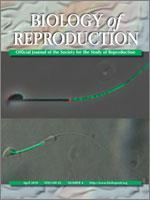Normal endometrial function requires a balance of progesterone (P4) and estrogen (E2) effects. E2 acts to stimulate the proliferation of uterine epithelial cells, while P4 action inhibits E2-mediated proliferation of the epithelium. P4 through its cognate receptor, the P4 receptor (Pgr), has important roles in the establishment and maintenance of pregnancy. In previous studies, we have identified ERBB receptor feedback inhibitor 1 (Errfi1) as a downstream target of Pgr action in the uterus. Herein, we show that Errfi1 mRNA expression was significantly increased in the uterus after Day 2.5 of gestation. Its expression is also induced in the uterus by acute E2 treatment, and this induction is synergistically induced by chronic E2 and P4 treatment. Although it is known that conditional ablation of Errfi1 in the Pgr-positive cells (Errfi1d/d) results in infertility, the function of Errfi1 in reproductive biology has remained elusive. Using Errfi1d/d mice, we have identified Errfi1 as an important mediator of uterine implantation. Epithelial ESR1 and target genes were significantly increased in the uteri of Errfi1d/d mice. Our results identify a new signaling paradigm of steroid hormone regulation in female reproductive biology that adds insight into the underlying dysregulation of hormonal signaling in human reproductive disorders such as endometriosis and endometrial cancer.
How to translate text using browser tools
16 December 2009
ERBB Receptor Feedback Inhibitor 1 Regulation of Estrogen Receptor Activity Is Critical for Uterine Implantation in Mice
Tae Hoon Kim,
Dong-Kee Lee,
Heather L. Franco,
John P. Lydon,
Jae-Wook Jeong
ACCESS THE FULL ARTICLE

Biology of Reproduction
Vol. 82 • No. 4
April 2010
Vol. 82 • No. 4
April 2010
Errfi1
estradiol receptor
estrogen
estrogen receptor
female reproductive tract
implantation
steroid hormones




